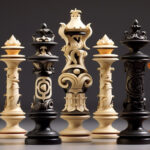Chess is a fascinating game that has captured the hearts and minds of millions around the world. It is a game of strategy, skill, and patience. If you are new to chess, the best way to improve your game is by reading chess books. In this article, we will explore why chess books are important for beginners (0-1200 ELO), the types of chess books available, and our recommendations for the best chess books for beginners.

Why Reading Chess Books is Important for Beginners
Chess is a game that has been played for centuries, and it is still popular today. If you are a beginner, reading chess books can help you develop your skills and improve your game. Here are some reasons why:
Building a strong foundation
Reading chess books allows a beginner to develop a strong foundation of the game’s rules and principles. Books can help beginners learn the value of each piece, how pieces move, and how to control the center of the board, among other things. By understanding the basics of the game, beginners can build a solid foundation on which to improve their skills.
One book that is particularly useful for beginners is “Chess for Dummies” by James Eade. This book explains the basics of the game in a clear and concise manner, making it easy for beginners to understand. It covers everything from how the pieces move to basic strategies and tactics.
Developing critical thinking skills
Chess is a game that requires critical thinking and problem-solving skills. By reading books, beginners can learn how to think ahead and visualize different scenarios on the board. This can help them develop their analytical skills and improve their decision-making abilities.
Another book that is great for beginners looking to develop their critical thinking skills is “Logical Chess: Move by Move” by Irving Chernev. This book analyzes 33 master games, move by move, and explains the thought processes behind each move. By studying these games, beginners can learn how to think like a chess player and develop their own analytical skills.
Learning from the masters
Chess books offer a beginner a chance to learn from the masters. Reading books by famous chess players can teach beginners different strategies and techniques used by the professionals. By studying the games of the greats, beginners can learn how to play like a pro.
One book that is highly recommended for beginners is “My System” by Aron Nimzowitsch. This book is a classic in the world of chess literature and is considered one of the best books ever written on the game. It teaches beginners the importance of controlling the center of the board and offers many other valuable insights into the game.
Overall, reading chess books is an essential part of learning and improving your game. Whether you are a beginner or an experienced player, there is always something new to learn from the world of chess literature.
Types of Chess Books for Beginners
Chess is a game that has been played for centuries, and it has evolved over time. To become a skilled chess player, it is important to learn the basics and then gradually build your knowledge and skills. There are different types of chess books that cater to different areas of the game. Here are some popular categories:
Strategy and tactics
Books that focus on strategies and tactics teach beginners how to think ahead and plan their moves. They explain how to create various threats on the board and how to counter your opponent’s moves. For example, one strategy that is often discussed in these books is the “fork,” which is when a single piece threatens two or more of your opponent’s pieces at the same time. By learning how to use this and other tactics, beginners can gain an advantage over their opponents.
Opening theory
Chess openings refer to the first few moves made by both players. Books that focus on opening theory teach beginners how to control the center of the board and protect their pieces while attacking their opponent’s pieces. There are many different opening strategies, and each one has its own strengths and weaknesses. By studying opening theory, beginners can learn how to make effective moves from the very beginning of the game.
Endgame technique
Endgame refers to the final stages of the game where few pieces are left on the board. Books that focus on endgame technique teach beginners how to win in these situations. Endgames can be tricky, and it is important to know how to use your remaining pieces to your advantage. For example, one common endgame scenario is the “king and pawn” endgame, where both players have only a few pawns and their kings left on the board. By learning how to maneuver in these situations, beginners can secure a win even when the odds seem against them.
Biographies and game collections
Biographies and game collections are books that shed light on famous chess players’ lives and highlight their most memorable games. Reading these books allows a beginner to learn from the successes and failures of the masters. For example, a beginner might read about the famous game between Bobby Fischer and Boris Spassky in the 1972 World Chess Championship, where Fischer used an unusual opening move to secure an advantage and ultimately win the game. By studying the games of great players, beginners can gain insight into the strategies and tactics that have been successful in the past.
Overall, there are many different types of chess books that can help beginners improve their skills. By studying these books and practicing regularly, beginners can become skilled chess players and enjoy the game for years to come.
Top Chess Books for Absolute Beginners
If you’re an absolute beginner to the game of chess, fear not! With the right resources and a bit of practice, you’ll be making strategic moves in no time. Here are our top recommendations for chess books to get you started:
“Bobby Fischer Teaches Chess” by Bobby Fischer
This book is perfect for beginners because it introduces the basics of chess in an accessible and straightforward way. Bobby Fischer, a legendary chess player, explains how each piece moves and teaches beginners different strategies. The book is written in a conversational tone, making it easy to follow along and understand even the most complex concepts. Fischer’s passion for the game is evident in every page, and his enthusiasm is contagious.
You can find this book here.
“Chess for Kids” by Michael Basman
If you’re looking for a fun and engaging way to learn the game of chess, look no further than “Chess for Kids” by Michael Basman. This book is designed for younger audiences but is an excellent beginner’s guide for adults as well. It is colorful, easy to read, and teaches the basics of chess while maintaining a fun and engaging tone. The book includes interactive puzzles and games that will help you develop your skills and keep you entertained for hours.
“Play Winning Chess” by Yasser Seirawan
If you’ve already learned the basics of chess and are looking for ways to improve your game, “Play Winning Chess” by Yasser Seirawan is the perfect book for you. Seirawan is a four-time United States Champion and a former World Championship contender, and his expertise shines through in this book. “Play Winning Chess” covers the principles of strategy and tactics and introduces the concept of positional play. The book is written in a clear and concise manner, making it easy to understand even the most complex ideas.
Whether you’re a complete novice or an experienced player looking to improve your skills, these books are sure to help you on your chess journey. Happy reading and good luck on the board!
Best Chess Books for Intermediate Beginners
If you are looking to take the next step in your chess journey, these books are a great place to start. Chess is a game of strategy and intelligence, and it takes time and effort to master. However, with the right resources, you can improve your skills and become a better player. Here are some of the best chess books for intermediate beginners:
“Logical Chess: Move by Move” by Irving Chernev
This book is an excellent addition to any beginner’s collection. It approaches the game move by move, explaining each decision and the thinking behind it. It offers valuable insights into the game. Chess is a game of strategy, and understanding the thought process behind each move is crucial to improving your game. This book will help you develop your analytical skills and teach you how to think like a chess master.
One of the great things about this book is that it is easy to read and understand. The author uses clear and concise language, making it accessible to beginners. It covers a wide range of topics, from opening strategies to endgame tactics. Whether you are a beginner or an experienced player, this book is a must-read.
You can find this book here.
“The Amateur’s Mind” by Jeremy Silman
This book is perfect for beginners looking to improve their analytical skills and critical thinking. It covers common mistakes beginners make and teaches how to recognize and fix them. Chess is a game of mistakes, and even the best players make them. However, the key to becoming a better player is to learn from your mistakes and avoid making the same ones twice.
The author of this book, Jeremy Silman, is a renowned chess coach and writer. He has written several books on chess, and “The Amateur’s Mind” is one of his best works. The book is easy to read and understand, and it is full of practical advice and tips on how to improve your game. It covers a wide range of topics, from opening strategies to endgame tactics.
“My System” by Aron Nimzowitsch
This book is famous for introducing the concept of positional play. It offers a unique perspective on the game and teaches beginners how to plan and create long-term strategies. Chess is not just about making good moves; it is also about planning ahead and anticipating your opponent’s moves. This book will teach you how to do just that.
The author, Aron Nimzowitsch, was a chess master and one of the leading players of his time. His ideas on chess strategy and positional play have influenced generations of players. “My System” is one of his most famous works, and it is a must-read for anyone looking to improve their game. The book is well-written and easy to understand, and it covers a wide range of topics, from opening strategies to endgame tactics.
In conclusion, these three books are some of the best resources available for intermediate beginners looking to improve their chess skills. They cover a wide range of topics and offer valuable insights into the game. Whether you are a beginner or an experienced player, these books are a must-read.
Conclusion
In conclusion, reading chess books is essential for anyone looking to improve their game. It allows beginners to develop a strong foundation, critical thinking skills, and learn from the masters. There are different types of chess books, and our recommendations for the best chess books are tailored to different skill levels. Start with the beginner books and work your way up to the intermediate books to become a stronger chess player.
FAQs
Why should you play chess?
Playing chess can help you strengthen your problem-solving skills, use different parts of your brain, and build your pattern recognition skills.
Who is the all-time best chess player?
Garry Kasparov is known as one of the best chess players of all time. However, Bobby Fischer is perhaps better known in Western culture.
What books should I read as a chess beginner?
Chess 101 by Dave Schloss, The Steps Method by Rob Brunia and Cor van Wijgerden, and Beginning Chess by Bruce Pandolfini are all great books tailored to new chess players.
- The 11 Best Books About Cats You Should Read - January 16, 2024
- The 9 Best Books on Building Confidence - January 16, 2024
- Discover the 10 Best Books on the Brain - January 16, 2024









